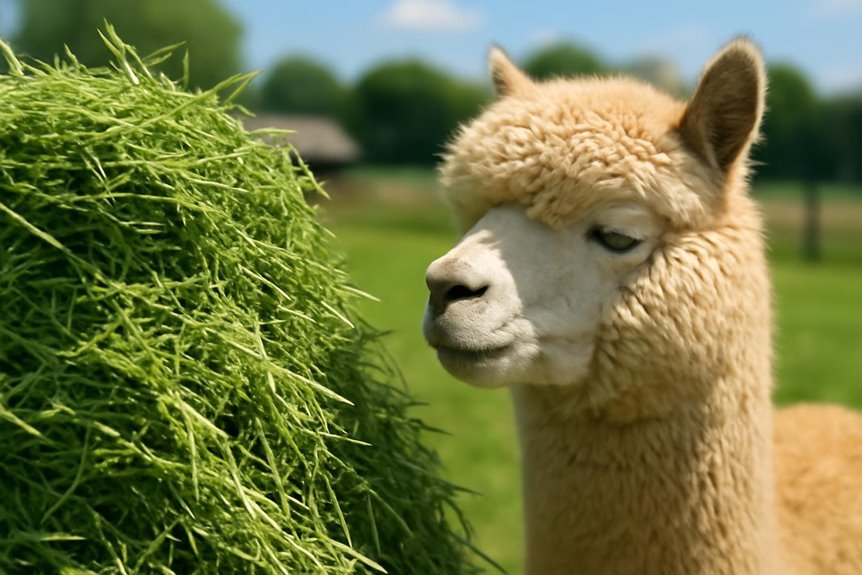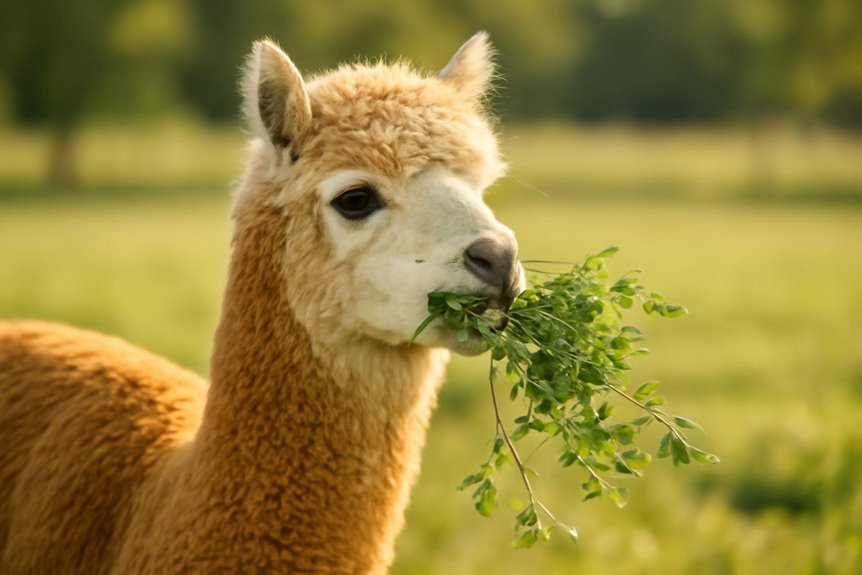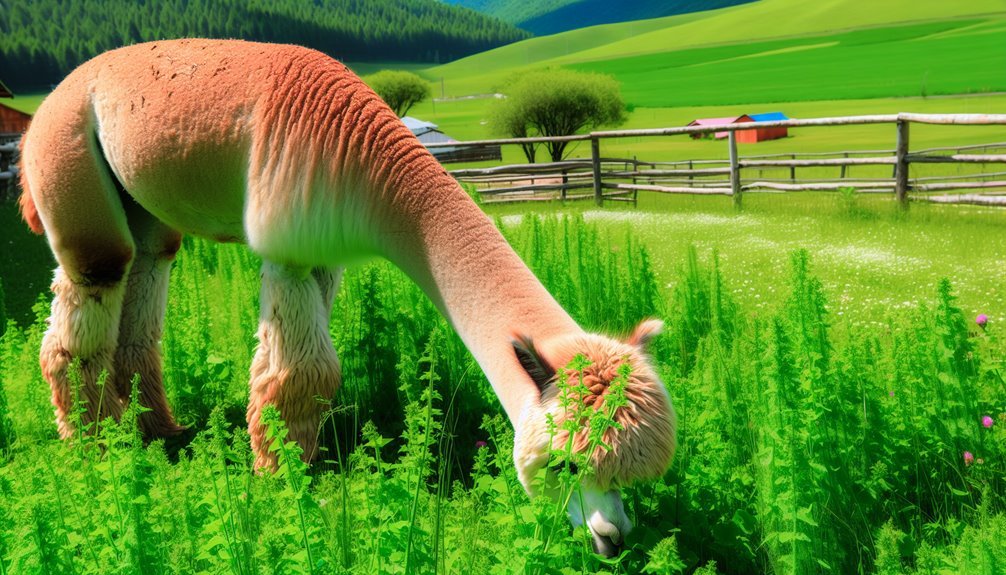10 Best Foods for Alpacas Producing Quality Fiber
To help your alpacas produce top-quality fiber, focus on feeding them high-quality grass hay like orchard grass and timothy hay for essential fiber and digestion support. Include alfalfa hay during pregnancy or colder months for extra protein and calcium. Supplement with Mazuri Alpaca Care Feed and flaxseed to boost fiber softness and health. Always provide fresh water and safe fruits or veggies sparingly. Keep this balanced diet in mind, and you’ll soon see healthier, finer fleece results—there’s more to discover on optimizing their nutrition.
Key Takeaways
- High-quality grass hay with long fibers supports digestion and enhances alpaca fleece quality.
- Flaxseed supplements boost omega-3 intake, improving fleece luster, softness, and overall immune health.
- Mazuri Alpaca Care Feed offers balanced protein and nutrients tailored for fiber growth and overall well-being.
- Alfalfa hay provides essential protein and calcium, especially beneficial for pregnant or lactating alpacas to maintain fiber quality.
- Consistent access to fresh, clean water is vital for hydration, digestion, and producing healthy, high-quality fiber.
High-Quality Grass Hay

High-quality grass hay, like timothy or orchard grass, is key to keeping your alpacas healthy and happy. Choosing long fiber grass hay guarantees they get the right fiber to support digestion and maintain the quality fiber in their fleece. Alpacas can be picky, often rejecting lower-quality hay, so offering only high-quality options reduces waste and boosts nutrient intake. You’ll want to avoid excessive high-protein hay, which can coarsen their fiber and hurt fleece quality. Properly storing hay is just as important—moisture leads to mold and nutrient loss, which can negatively impact your alpacas’ health and fiber production. By providing a consistent supply of first-rate grass hay, you’re supporting their well-being and helping them produce fine, quality fiber for garments.
Orchard Grass
Orchard grass stands out as a top choice for feeding your alpacas because of its high fiber content and palatability. This quality feed supports their digestive health while providing essential nutrients without excess protein, helping to maintain ideal weight in non-reproducing adults. Its fine texture reduces digestive risks, making it suitable for all life stages. When you include orchard grass in your alpacas’ diet, you’re offering:
Orchard grass offers high fiber, gentle texture, and balanced nutrition ideal for all alpaca life stages.
- Soft, leafy blades that alpacas enthusiastically consume
- A balanced source of fiber promoting healthy digestion
- Versatility to mix with other grasses or legumes for nutrient variety
To guarantee your alpacas get the best fiber and nutrition, regularly test orchard grass for nutrient quality, supporting their fleece’s health and overall well-being.
Timothy Hay
While Timothy hay might not be as soft as some grasses, its high fiber content and balanced nutrients make it an excellent choice for your alpacas. Its nutrition profile provides essential fiber without excessive protein, which suits alpacas’ dietary needs perfectly. The lower calcium content compared to legume hays helps reduce risks of urinary calculi, supporting your animals’ health. The long, coarse fibers promote healthy digestion and naturally wear down their teeth, preventing dental issues. You’ll notice quality Timothy hay by its green color and sweet aroma, indicating good nutrition and palatability. Since alpacas are selective eaters, they often prefer the softer leaves, ensuring they consume enough to maintain their health and produce quality fiber consistently.
Alfalfa Hay

Because alfalfa hay is rich in protein and calcium, it’s especially beneficial for pregnant or lactating alpacas who need extra nutrients. This high quality legume hay supports growth and fiber production but should be fed carefully to avoid coarser fleece or weight gain in non-reproducing adults. You’ll find alfalfa hay especially useful during winter months when pasture quality dips. To maximize benefits, offer alfalfa hay alongside grass hay so your alpacas can enjoy:
- Soft leaves and stems that boost nutrient intake
- A rich energy source for growing crias and nursing females
- A supplement to maintain health when forage quality falls
Mazuri Alpaca Care Feed
When choosing Mazuri Alpaca Care Feed, you’ll find it’s packed with moderate protein and added flaxseed to support health and fiber growth. It’s designed to meet the needs of growing crias and adults alike, ensuring balanced nutrition at every life stage. Plus, you can pick between pelleted or crumble forms to suit your alpacas’ preferences and special dietary needs.
Nutrient Profile Highlights
If you want to support your alpacas’ health and fiber quality, Mazuri Alpaca Care Feed offers a balanced nutrient profile tailored to their needs. Its carefully crafted formula provides the right nutrient balance to enhance Alpaca Fleece Quality without risking overfeeding. Key highlights include:
- Moderate protein levels that promote healthy fiber growth
- Added flaxseed supplying omega-3 fatty acids for fleece luster and immune support
- Essential vitamins and minerals designed to maintain overall health and fiber integrity
This blend helps prevent coarse fiber caused by improper nutrition, ensuring your alpacas produce soft, high-quality fleece. By choosing Mazuri, you’re giving your herd the thorough care they need to thrive and produce outstanding fiber season after season.
Benefits for Growing Alpacas
Mazuri Alpaca Care Feed doesn’t just support adult alpacas—it’s specially formulated to meet the needs of growing crias and young alpacas. Nutrition is essential during this stage, and this feed provides a balanced blend of moderate protein and dietary fiber to promote healthy development. Added flaxseed boosts immune and heart health, which supports overall growth and quality fiber production. By regularly checking your hay or pasture for nutrient gaps and supplementing with Mazuri, you guarantee your young alpacas get the best nutrients needed for strong, healthy fleece. This feed’s formulation makes it easier for growing alpacas to digest and absorb nutrients, setting them up for successful fiber production as they mature and thrive.
Pellet and Crumble Options
You’ll find two convenient forms of Alpaca Care Feed—pellets and crumbles—each designed to support your alpacas’ health and fiber production at any stage. Both options provide balanced nutrition with moderate protein and added flaxseed, promoting immune strength and heart health essential for producing fine fleece. Whether you’re feeding growing crias or lactating females, these feeds supply the right energy without compromising fleece quality. Plus, their complete nutrient profile means you won’t need extra supplements.
With Mazuri Alpaca Care Feed, you get:
- Nutrient-dense pellets or easily digestible crumbles
- Support for peak alpaca health and fiber growth
- Convenient feeding options tailored to all life stages
Choosing these feeds helps maintain vibrant fleece while ensuring overall alpaca health.
Mazuri Alpaca Performance Feed
When aiming to boost your alpaca’s fiber quality, especially in the last 120 days of pregnancy, a specialized feed like Mazuri Alpaca Performance Feed can make all the difference. This feed is specially formulated to enhance fiber production, supporting alpaca health and quality during critical growth periods. Packed with flaxseed, it delivers omega-3 fatty acids that promote immune and heart health while improving fleece luster. Its balanced nutrients reduce the need for extra supplements, ensuring your alpacas stay in peak condition. Available in pelleted and crumble forms, Mazuri Alpaca Performance Feed suits different feeding preferences and helps prevent choking hazards. Backed by research and proven to produce champion alpacas, this feed is a smart choice for anyone serious about high-quality alpaca fiber.
Loose Mineral Mix for Alpacas

Although your alpacas get most of their nutrients from forage and feed, providing a high-quality loose mineral mix year-round is crucial to supply the trace minerals and vitamins they need for health and fiber quality. A mineral mix tailored specifically for alpacas guarantees they receive essential nutrients like calcium, phosphorus, and selenium, which support ideal growth and help produce a high-quality fleece.
High-quality loose mineral mixes year-round ensure alpacas get vital nutrients for health and premium fleece quality.
To make the most of your mineral mix:
- Place it in a sheltered spot near their feed for easy, free-choice access
- Avoid mixes meant for other livestock, especially those containing copper
- Regularly check and refresh the minerals to prevent contamination and encourage consumption
Fresh Water
You can’t overlook fresh water when caring for your alpacas—it’s essential for their hydration and overall health. Providing clean, palatable water 24/7 helps maintain their digestive system and supports fiber quality. Make sure to regularly clean and refill their water sources to keep them healthy and thriving.
Hydration Importance
Since alpacas rely heavily on fresh water for their health, ensuring they have constant access to clean, palatable water is essential. The hydration importance can’t be overstated—it’s essential for alpaca health, supporting digestion and preventing urinary issues. You should provide water 24/7, especially during hot weather or lactation when intake rises considerably.
Keep in mind these key points for ideal hydration:
- Alpacas drink 5-8% of their body weight daily, increasing up to 18% in heat or lactation
- Regularly clean water tanks and sources to avoid contamination
- Check automatic watering systems daily to guarantee fresh water availability
Water Quality Standards
When providing fresh water for alpacas, maintaining strict quality standards is essential to keep them healthy and hydrated. Alpacas typically drink 5-8% of their body weight daily, increasing in hot weather or during lactation, so ensuring constant access to clean, palatable water supports their digestive health and prevents urinary issues. To maintain ideal water quality, you should regularly check and clean water tanks to avoid contamination. Automatic watering systems help provide continuous access, but daily monitoring is necessary to confirm they work correctly. By prioritizing water quality, you promote your alpacas’ overall health, which directly impacts their fiber’s quality. Clean, fresh water is a simple yet critical factor in supporting their well-being and maximizing fiber production.
Flaxseed Supplements
Although flaxseed might seem like a simple addition, it plays an essential role in boosting your alpaca’s immune system and enhancing the shine and softness of their fleece. Flaxseed is packed with omega-3 fatty acids, which directly contribute to higher quality fiber by making the fleece more lustrous and soft. Adding flaxseed supplements balances your alpaca’s diet, especially when paired with premium feeds like Mazuri Alpaca Performance.
Here’s what flaxseed brings to your alpaca’s nutrition:
- Rich omega-3s that improve fleece luster and softness
- Support for heart health and overall well-being
- Proven results in champion-quality fiber production
Including flaxseed in your alpaca’s diet is a smart step toward producing premium-quality fiber.
Safe Fruits and Vegetables
When feeding your alpacas, choosing nutrient-rich vegetables like carrots and romaine lettuce can boost their health. Safe fruits such as shredded apples and berries make great occasional treats but should be given in moderation. Remember to introduce these foods gradually and chop them finely to keep your alpacas safe and comfortable.
Nutrient-Rich Vegetable Choices
Because alpacas have sensitive digestive systems, you’ll want to introduce nutrient-rich fruits and vegetables gradually as occasional treats. These foods can boost nutrient levels while keeping your alpaca happy and healthy. Always chop or shred veggies to prevent choking, given their limited teeth. Beet pulp is an excellent high-fiber option; just pre-soak it to avoid any hazards. Some safe, nutrient-rich vegetable choices include:
- Shredded carrots for beta-carotene and fiber
- Broccoli stalks rich in vitamins and minerals
- Romaine lettuce providing hydration and gentle nutrients
Safe Fruit Options
If you want to add variety to your alpaca’s diet, safe fruit options like shredded apples, bananas, berries, and watermelon make excellent occasional treats. These fruits are essential for providing extra nutrients and keeping your alpaca interested in their food. Always chop or shred fruits to prevent choking since alpacas have limited teeth for slicing. Introduce new fruits gradually to avoid nervousness when they encounter unfamiliar tastes. Vegetables such as carrots and broccoli stalks also serve as healthy additions. Remember to avoid toxic fruits like avocados and cherries, as well as nightshade plants like eggplant and potatoes, which can harm your alpacas. Offering these safe fruit options thoughtfully supports your alpaca’s health and contributes to producing quality fiber.
Feeding Frequency Guidelines
Although alpacas enjoy a variety of safe fruits and vegetables, you should offer these treats sparingly and introduce them gradually to avoid digestive upset. Feeding frequency plays a key role in maintaining your alpaca’s digestive health alongside their main diet of hay or pasture. Stick to occasional treats, no more than twice a week, to complement their balanced forage intake.
Here’s a simple feeding guideline to keep in mind:
- Small, shredded portions of fruits and veggies, like apples or romaine lettuce
- Avoid large quantities to prevent digestive disturbances
- Always monitor your alpaca for any signs of discomfort
Frequently Asked Questions
What Is the Best Food for Alpacas?
You’ll want to focus on alpaca nutrition by offering high-quality hay and pasture with soft grasses. Adding specialized feed and mineral mixes helps enhance fiber quality, supporting your alpacas’ health and producing superior fleece.
What Fiber Does an Alpaca Produce?
You’ll find alpacas produce luxurious fiber known for softness and crimp. Alpaca fiber characteristics like micron diameter and staple length affect fiber quality factors, making their fleece durable, warm, lightweight, and ideal for fine textile products.
Is Oatmeal Good for Alpacas?
Like a gentle breeze, oatmeal benefits alpaca nutrition by providing energy and aiding weight management. But you shouldn’t overfeed it—balance with high-fiber forage to keep digestion smooth and your alpacas healthy and happy.
Are Bananas Good for Alpacas?
You can offer bananas occasionally as a tasty treat, but don’t overdo it. Banana benefits include vitamins and minerals, yet their high sugar means they should only be a small part of your alpaca’s diet to stay healthy.







Our picks
Alpaca & Wool Felted Sole Inserts: Comfy Upgrade?
Best Alpaca Socks for Hiking: Ultimate Comfort and Durability on Trails
Best Alpaca Halter for Comfort and Control